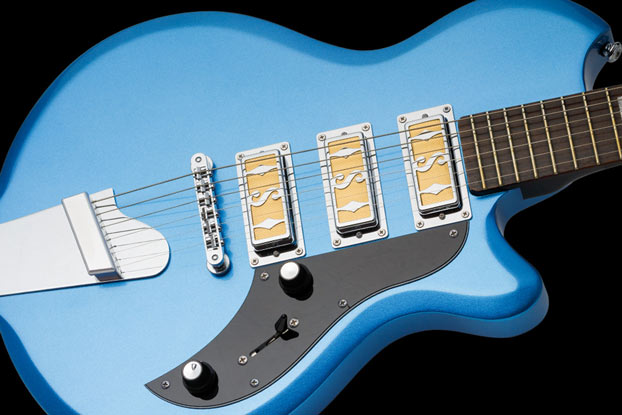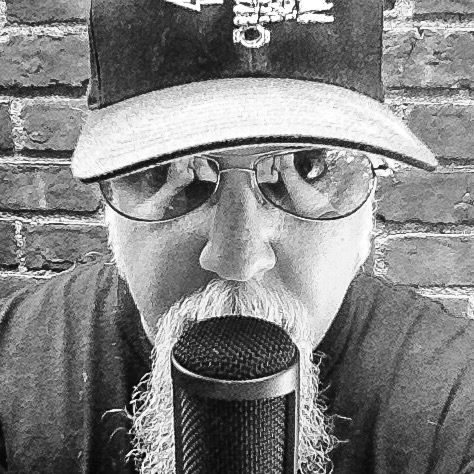Review: Supro Island Series Guitars

GOLD AWARD
Guitars made by the Valco company during the Fifties and Sixties (which include the Supro, National, and Airline brand names, among several others) are often categorized as “pawn shop prizes.”
But while the original models were designed to be more affordable than those of most of their competitors, they also had their own distinctive brand of innovation and funk going on, which made them much more than mere “budget” instruments.
Lots of players picked up on the distinctive sounds of Supro guitars, including Link Wray (who recorded “Jack the Ripper” and several other delightfully distorted ditties with Supro guitars in the late Fifties and early Sixties), Jimi Hendrix (whose very first guitar was a Supro), and David Bowie (who performed with a Supro during latter-year tours).
The good folks who revived the awesome Supro amps are now doing the same thing with Supro guitars. The new Supro guitars are inspired by the originals, but instead of being exact reproductions they combine the irresistible visual appeal of the classics with timeless features and modern refinements to please today’s players.
We took a look at the Hampton and Westbury models from Supro’s Island solidbody series, which are just one part of the exciting and welcome resurrection of Supro guitars.
FEATURES
All of the new Supro Island series guitars (which also includes the single-pickup Jamesport model) have a beveled body shape based on the original Ozark model from the Sixties. The main differences between the Hampton and the Westbury are the pickup configurations—the Hampton has three mini-humbucker-size Mini Gold Foil pickups while the Westbury has two regular humbucker-size Vintage Gold Foil pickups—and the corresponding wiring configurations, with the Hampton featuring a five-position blade pickup selector switch while the Westbury has a conventional three-way toggle.
Get The Pick Newsletter
All the latest guitar news, interviews, lessons, reviews, deals and more, direct to your inbox!
Features common to both models include an alder body with a set maple neck featuring a black satin finish, rosewood fingerboard, block inlays, 22 size 6100 frets, 25.5-inch scale, 12-inch radius, and generous C-shaped profile. Our Hampton had a dazzling Ocean Blue Metallic finish, while the Westbury had an Antique White finish, which, in conjunction with its sweeping black pickguard, reminded us of the beloved Supro Dual Tone’s art deco two-tone styling. It should be noted that the necks are chunkier than most of today’s slim and svelte neck profiles, but it’s more cricket paddle than baseball bat.
The Supro Gold Foil pickups are one of the main points of interest, based on the original designs that Ralph Keller developed for Valco during the early Fifties but modernized and refined by Supro’s David Koltai and Glenn Sweetwood with assistance from vintage pickup expert Ken Calvet. In addition to their sweet, blingy looks, these single-coil pickups feature a field coil design with no pole pieces, which delivers a wider frequency response and low-noise performance.
PERFORMANCE
In a world where the vast majority of guitars sound and feel pretty much similar, Supro’s Island series stands (as the name suggests) on its own individual territory. The Hampton and Westbury feel exceptionally solid in the player’s hands, and a well-executed power chord causes the body to vibrate and resonate with organic liveliness. The neck may be fatter than what most of today’s players are accustomed to, but it’s not uncomfortable and the tonal rewards more than make up for any additional effort.
The electronics alone are going to convince most players that these guitars are must-haves. The full-sized Gold Foil pickups in the Westbury sound big and beefy but there is a delicious treble edge that makes the tone crisp and articulate. The bridge pickup is slightly hotter, and the neck pickup is reverse wound to completely eliminate noise when both pickups are selected. The Hampton sounds like the fattest Strat known to mankind. Its bridge pickup is also overwound, and the middle pickup has a reverse wind/reverse phase design to provide hum cancellation in the dual pickup (“in between”) settings.
Both guitars have their own distinct voices, which deliver deeper, bigger bass and fuller, richer treble than typical single-coil pickup designs. The tone is almost like that of a humbucker but with more lively, “three-dimensional” character in the upper midrange and treble frequencies that’s never shrill or piercing. If you’re looking for a new sound, the Supro Island series is worth exploring.
LIST PRICES: $999 (Westbury), $1,099 (Hampton)
MANUFACTURER: Supro, suprousa.com
• The Hampton features three mini-humbucker-size Gold Foil pickups and a five-position blade pickup selector switch.
• The Westbury offers two full-size Gold Foil pickups and a traditional three-way pickup selector toggle switch.
• The Gold Foil single-coil pickups have a field-coil design with no pole pieces that delivers wider frequency response and richer tones.
• The beveled body design is based on the original Supro Ozark model from the Sixties and provides exceptional playing comfort.
THE BOTTOM LINE
While the original Supro guitars still enjoy cult status amongst a select group of players, the new models and their exciting new tones are sure to expand the appeal of Supro guitars to a much larger group.
Chris is the co-author of Eruption - Conversations with Eddie Van Halen. He is a 40-year music industry veteran who started at Boardwalk Entertainment (Joan Jett, Night Ranger) and Roland US before becoming a guitar journalist in 1991. He has interviewed more than 600 artists, written more than 1,400 product reviews and contributed to Jeff Beck’s Beck 01: Hot Rods and Rock & Roll and Eric Clapton’s Six String Stories.
“I didn’t think anybody would believe I got it from George Harrison. I figured they’d call me a liar”: Vintage guitar guru Norman Harris names the 5 most memorable guitars that have come through Norman's Rare Guitars
“What blew me away was that everyone wanted the curly maple top. People were calling, saying, ‘I’ve got to have the bird inlays’”: Paul Reed Smith on raising the Standard 24, finally cracking the noise-free guitar and why John Sykes is a tone hero



![[from left] George Harrison with his Gretsch Country Gentleman, Norman Harris of Norman's Rare Guitars holds a gold-top Les Paul, John Fogerty with his legendary 1969 Rickenbacker](https://cdn.mos.cms.futurecdn.net/TuH3nuhn9etqjdn5sy4ntW.jpg)







